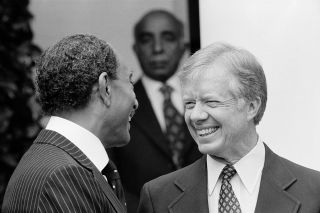Politics
Is It Time for Presidential Fitness-for-Duty Evaluations?
What presidential fitness-for-duty assessments could look like—and why we likely won’t get them.
Updated July 8, 2024 Reviewed by Michelle Quirk
Key points
- Discussion of formal presidential fitness assessment procedures dates back to the Carter administration.
- Presidential fitness for duty involves medical, psychological, military, and financial considerations.
- Polarization will likely prevent the implementation of presidential fitness-for-duty evaluations anytime soon.

“Mental fitness” is a popular term these days. Both presidents Trump and Biden have faced criticism about their ability to serve in the role.
Yet the media and politicians alike tend to bastardize the phrase. The result? Gross public misunderstanding and frequently off-point media debate.
“Mental Fitness”: What Are We Really Talking About?
The basic idea being debated in these situations concerns fitness for duty. One’s fitness for duty answers whether a person may competently perform the duties of their job. Mental fitness is a bit more complicated than that, unfortunately.
Fitness for duty is a medical-legal question about a professional’s (dis)ability. It is answered in part through a formal mental health assessment. These mental health-related exams tend to happen in professions or situations where the examinee’s mental state places their safety, or that of others, at risk. High-stress professions include the military, law enforcement, medicine, and certain civil service roles.

Answering the fitness question is two-fold. Fitness-for-duty evaluations require a trained clinician (1) to assess whether a mental health concern such as dementia, depression, or substance abuse is present, and (2) to determine whether that condition renders the person in question unfit to perform their duties.
Specific methods for fitness-for-duty evaluations vary by the setting and type of professional being assessed. As is indicated in the clinical literature, possible methods include the following:
- A detailed interview
- Speaking to collateral contacts (e.g., co-workers, other health providers)
- Reviewing records
- Psychological testing addressing personality traits, cognitive functioning, or mental health symptoms
- Role-playing job-related scenarios
A scientific review of job-related fitness evaluations also provides valuable context. For instance, determination is not simply a fit/unfit decision. Middle-ground options exist such as fit with restrictions. Also, the decision-making processes to reach these conclusions are unclear. The science underlying fitness-for-duty is quite limited.
Presidential Fitness for Duty
The reality is that presidential fitness-for-duty isn’t really a thing. Yes, the 25th Amendment allows for the removal of the president if they are “unable to discharge the powers and duties of his office.” Yet no formal process or criteria currently exist.
Conversations about a formal presidential fitness-for-duty process date back to the Carter administration. As has been argued in a prior Psychology Today piece, it’s time to consider presidential fitness-for-duty evaluations. In that piece, Dr. Clifford Lazarus reminds us that the idea of presidential fitness for duty is not new: President Jimmy Carter raised the idea of having a panel of appointed physicians who would engage in the regular evaluation of the president.

In a 2017 article in the Journal of the American Medical Association, specifics were laid out for what an appointed panel could look like. It was argued that presidential fitness should include an assessment of medical, psychological, and financial aspects. The panel would include the following:
- Three psychiatrists—one clinical, one academic, and one military—to assess mental health and provide varying insights into what a president may encounter on the job (e.g., involving military scenarios and nuclear codes)
- One clinical psychologist to focus on psychological assessment
- One neurologist to offer expertise on cognitive decline and/or brain dysfunction
- Two internists to provide input on general medical concerns
Of course, this is just one picture of what presidential fitness for duty could look like. It does not address an obvious and increasing problem: political polarization. While the 2017 JAMA article suggests presidential fitness panel members be appointed by the scientific community, this solution seems unrealistic in today’s extremely partisan American culture.

Both the media and lay public have appointed themselves arbiters of legal presidential fitness of late. I myself have encountered the argument: “Voters decide who is competent to be in office!” Voters are qualified to decide who they want to represent them based on candidate policy stances, character, and other increasingly polarized rationales. Voters are not, however, qualified to determine medical-legal fitness.
So where does this leave us? As much as either political side wants to declare the other's presidential candidate to be unfit—be it due to personality pathology or cognitive decline—it remains unrealistic that such a formal process will be implemented in the near future.
From my perspective, it’s likely the political bottom will have to fall out before we finally put important presidential fitness-for-duty safeguards in place. What that bottom will be remains to be seen.
References
Matthew Nussbaum. Dozens of experts urge doctor to examine Trump’s neurological health during physical. Politico. January 11, 2018.
Rachel Looker and Courtney Subramanian. Biden interview fails to quell Democrat concerns over fitness. BBC. July 6, 2024.




